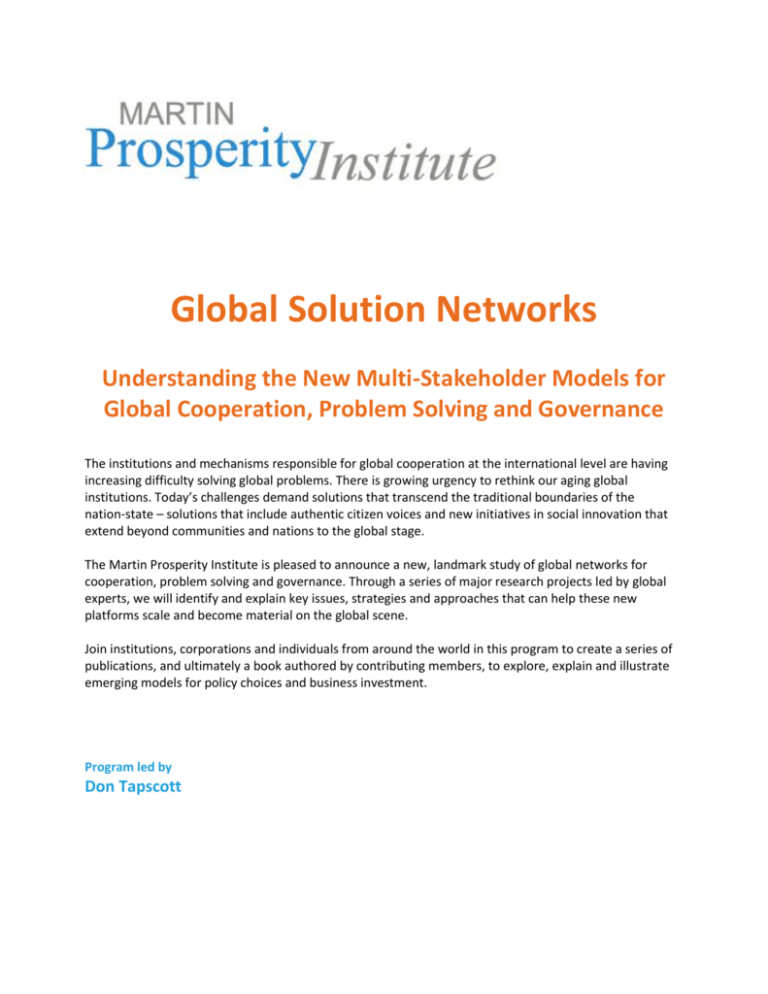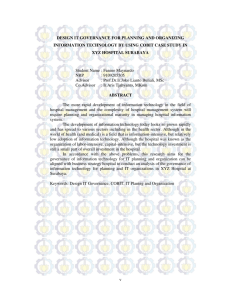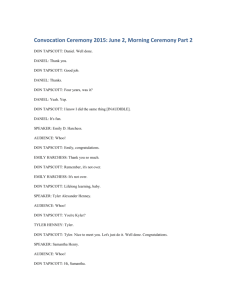Lorem ipsum dolor sit amet, consectetuer
advertisement

Global Solution Networks Understanding the New Multi-Stakeholder Models for Global Cooperation, Problem Solving and Governance The institutions and mechanisms responsible for global cooperation at the international level are having increasing difficulty solving global problems. There is growing urgency to rethink our aging global institutions. Today’s challenges demand solutions that transcend the traditional boundaries of the nation-state – solutions that include authentic citizen voices and new initiatives in social innovation that extend beyond communities and nations to the global stage. The Martin Prosperity Institute is pleased to announce a new, landmark study of global networks for cooperation, problem solving and governance. Through a series of major research projects led by global experts, we will identify and explain key issues, strategies and approaches that can help these new platforms scale and become material on the global scene. Join institutions, corporations and individuals from around the world in this program to create a series of publications, and ultimately a book authored by contributing members, to explore, explain and illustrate emerging models for policy choices and business investment. Program led by Don Tapscott GLOBAL SOLUTION NETWORKS New Platforms for Global Cooperation, Problem Solving and Governance T Introducing a New Syndicated Research Program from the Martin Prosperity Institute, in partnership with The Tapscott Group – Led by Don Tapscott here is a fundamental change underway regarding how global problems can be solved, and perhaps how we govern ourselves on this shrinking planet. Emerging non-state networks of civil society, private sector, government and individual stakeholders are achieving new forms of cooperation, social change and even the production of global public value. They address every conceivable issue facing humanity from poverty, human rights, health and the environment, to economic policy, war and even the governance of the Internet itself. Enabled by the digital revolution and required by the challenges facing traditional global institutions, these web-based networks are now proliferating across the planet and increasingly having an important impact in solving global problems and enabling global cooperation and governance. Call them Global Solution Networks. Yet to date there has been no systematic study of this phenomenon or an attempt to understand the potential for improving the state of the world. Little has been done to evaluate what makes these networks tick, how they succeed or fail, what impact they have and how they address the tough issues of legitimacy, accountability, representation and transparency. The Program T he Martin Prosperity Institute at the University of Toronto, in collaboration with The Tapscott Group— an international think tank headed by Don Tapscott, announces a new, multi-million dollar landmark investigation of new models for global cooperation, problem solving and governance. This timely and essential Global Solution Networks (GSN) program is being led by Don Tapscott, one of the world’s leading authorities on innovation, media and the social and economic impact of technology, and ranked #9 on the Thinkers50 list of the world’s most influential management thinkers. Confidential Draft Only – Do Not Distribute 2 GLOBAL SOLUTION NETWORKS Membership You are invited to join a select group of private sector, government, global institution and foundation investors as a Member of the GSN program. Membership will give you a voice in understanding, shaping and applying the models that are increasingly important in solving global problems. You will have the opportunity to work with a diverse group of leaders from the world, and a place will be reserved for you at our capstone meeting in 2014. Membership includes organization-wide access to all research and events plus the opportunity to contribute to the capstone book. Membership in this international non-profit program underwrites the cost of research and delivery. The Research Imperative Throughout the twentieth century nation states cooperated to build global institutions to facilitate joint action and address global problems. But from our inability to come to agreements on everything from how to stop warlords to climate change, fighting poverty, Palestinian statehood or how to govern the global financial system, many people are questioning why existing approaches have proven so inadequate to fixing a broken world. Arguably, the international institutions set up to govern a new world of nations after WWII, while necessary, are no longer sufficient. There is growing evidence that we need to rethink and rebuild many of the organizations and institutions that have served us well for decades, but now have come to the end of their life cycles. The global economic crisis should be a wakeup call to the world. The world is broken and the industrial economy and many of its institutions have finally run out of gas—from industries in crisis, governments that can’t get things done, failing newspapers and old models of financial services to our energy grid, transportation systems and institutions for global cooperation and problem solving. At the same time the contours of new enterprises and industries are becoming clear. Society has at its disposal the most powerful platform ever for bringing together the people, skills and knowledge we need to ensure growth, social development and a just and sustainable world. Because of the digital revolution, the old industrial models are all being turned on their head and new possibilities abound. Today, there are myriad fresh new collaborative models that are self-organizing to address twenty-first century realities. These models have various names including global action networks, multi-stakeholder networks, global alliances and stakeholder webs. In fact the entire concept of social innovation—new thinking and action for the public good—is being extended beyond communities and nations to the global stage. There is also wide variability in the purpose, structure, duration and modus operandi of these networks. But most of the new collaborations and networks include some combination of what are now four “pillars” of society— the state, the private sector, the civil society and now empowered individuals. “History has shown us that while the diversity of national interests provides breadth of perspective, it too often leads us to the lowest possible common denominator on issues of global importance.” — Klaus Schwab Founder and Chairman, World Economic Forum We are in the early days of understanding the new species of meta-networks. Research is critical and will answer these and other questions: How are these networks initiated? What problems are they addressing? Why do they fill a vacuum in the global governance scene? What impact are they having? What is the technology platform they use? How are they governed? How do they address the tough issues of legitimacy, representation and accountability? What can be done to make them more effective? Confidential Draft Only – Do Not Distribute 3 GLOBAL SOLUTION NETWORKS The Research Agenda • Summit on New Models of Global Problem Solving, Cooperation and Governance— Washington, D.C., hosted by the U.S. State Department • Summit on New Models of Global Problem Solving, Cooperation and Governance— Brussels, hosted by the Lisbon Council in partnership with the European Union • Summit on New Models of Global Problem Solving, Cooperation and Governance—New Delhi, hosted by the Prosperity Institute of India and India Competitiveness Institute • Capstone Event and Book Publication—2014 The GSN research projects will help members build their own roadmap for decisions and investments by: • Developing a robust taxonomy of the emerging models of global cooperation and platforms for problem solving (see p. 6) • Gathering a rich set of global case studies surrounding this taxonomy • Analyzing the challenges and obstacles to these new platforms, including legitimacy, accountability, participation, representation, power and relationship to international organizations and nation states Through a series of major research projects led by global experts, GSN will identify and explain key issues, strategies and approaches that can help the new platforms scale and become material on the global scene. These projects will create a series of publications, and ultimately a book authored by contributing members to explain and illustrate these new approaches to the world. Participation Please accept our invitation to join a group of leaders concerned with the present and future state of global governance. The GSN initiative is underway and draws upon a growing network of experts from around the world including: • Anne-Marie Slaughter, Professor of Politics and International Affairs, Princeton University; former Director of Policy Planning for the United States Department of State; author or editor of six books, including The Idea that is America • Kris Balderston, Special Representative for Global Partnerships, United States Department of State • Sara Boetigger, Founder and CEO, GATD (Global Access to Technology for Development) Foundation; Adjunct Professor, Department of Agricultural and Resource Economics, University of California, Berkeley • Jon Camfield, Technology Strategist, Ashoka Changemakers—Innovators for the Public • Geoff Cape, Co-Founder and Executive Director, Evergreen—inspiring and enabling action to green cities; social entrepreneur • Vint Cerf, Chief Internet Evangelist, Google • Aron Cramer, President and CEO, Business for Social Responsibility Deliverables and Events The GSN program will deliver new research, international cases studies and emerging models to help inform policy choices and business investments by institutions large and small. The research phase of the program will end in 2014, producing deliverables from dozens of sub-projects. In addition to an extensive research agenda and a custom briefing by Don Tapscott for each member organization, GSN program highlights includes: • Quarterly research updates delivered by webcast to member organizations • Project Collaborator Brainstorm—Martin Prosperity Institute, Rotman School of Management, University of Toronto, January 29, 2013 • Preliminary Results Summit—Center for International Governance Innovation. Toronto, May 2013 Confidential Draft Only – Do Not Distribute 4 GLOBAL SOLUTION NETWORKS • Karen Evans, National Director for the US Cyber Challenge (USCC); Partner, KE&T Partners LLC; former CIO of the United States • Richard Florida, Director, Martin Prosperity Institute; best-selling author of Rise of the Creative Class • Pankaj Ghemawat, Professor, Global Strategy, IESE, Barcelona; Global Strategist; author of World 3.0 • Parag Khanna, President, Hybrid Reality Institute; author of How to Run the World • Bruno Lanvin, Executive Director, eLab, INSEAD • Robert Madelin, Director-General for Information, Society and Media; former Director, Genereal Health and Consumer Affairs, European Commission • Barbara Ridpath, Chief Executive, International Center for Financial Regulation • Lynn St. Amour, President and CEO, Internet Society • Robert Steele, Secretary General (CEO), International Organization for Standardization • Anthony D. Williams, Fellow, Munk School of Global Affairs; co-author of best-selling Wikinomics • Sean Wise, Professor, Entrepreneurship and Strategy Department, Ted Rogers School of Management, Ryerson University • Ngaire Woods, inaugural Dean, Blavatnik School of Government; Professor, Global Economic Governance issues, and going beyond the international silos to create new networks of the willing and engaged. Contact For more information, or to subscribe to updates on this landmark program, please contact: Joan Bigham Managing Director Global Solution Networks joan@tapscott.com +1 860-536-6693 We’re not talking about making token efforts to widen the scope and scale of citizen participation in international forums. Nor are we proposing some grandiose vision of a representative global government or a new global bureaucracy. We’re talking about people and organizations from across society getting together to create inclusive and participative forums for the generation of ideas and implementation of solutions to today’s most pressing problems facing the world. And ultimately, this means doing away with traditional notions of control and ownership over Confidential Draft Only – Do Not Distribute 5 A TAXONOMY OF MULTI-STAKEHOLDER NETWORKS FOR GLOBAL PROBLEM SOLVING Network Type Description Examples Knowledge Networks The primary function of Knowledge Networks is to develop new thinking, research, ideas and policies that can be helpful in solving global problems. Their emphasis is on the creation of new ideas, not their advocacy. Stockholm International Peace Research Institute; Global Network for Women and Children’s Health Research; Habitat Jam, Wikipedia, TED Operational and Delivery Networks This class of networks actually delivers the change it seeks, supplementing or even bypassing the efforts of traditional institutions. Crisis Commons, Kiva, 350.org, The Standby Task Force, Digital Democracy, The Red Cross, World Wildlife Fund, Bill and Melinda Gates Foundation Global Health Program, Medicines for Malaria Venture, The Microcredit Summit Campaign Policy Networks Sometimes networks create government policy, even though they may consist of non-governmental players. Policy Networks may or may not be created or even encouraged by formal governments or government institutions. Some policy networks support policy development or create an alternative for policy. Policy networks also exist to create and encourage discussions on policy issues. The Internet Governance Forum, International Competition Network, The PRI (Principles for Responsible Investment) Advocacy Networks Advocacy Networks seek to change the agenda or policies of governments, corporations or other institutions. Avaaz.org, Keep a Child Alive, Conscious Capitalism (advocates to corporations). Hundreds of these networks are listed at World Advocacy.com. Watchdog Networks These networks scrutinize institutions to ensure that behave appropriately. Topics range from human rights, corruption, and the environment to financial services. Human Rights Watch, The Environmental Working Group, Amnesty International, The Global Reporting Initiative Platforms Some networks seek to provide platforms for other networks to organize. Ushahidi, Challenge Post, Change.org, seToolbelt, Code for America Global Standards Networks Non-state based organizations that develop technical specifications and standards Internet Engineering Task Force (IETF), World Wide Web Consortium Governance Networks These are multi-stakeholder networks who have achieved or been granted the right and responsibility of non-institutional global governance. Internet Corporation for Assigned Names and Numbers, International Organization of Securities Commissions, Marine Stewardship Council, Forest Stewardship Council, The Kimberly Process Certification Scheme Networked Institutions Some networks provide such a wide range of capabilities they could be described as Networked Institutions. They are not state-based but rather true multi-stakeholder networks. But the value they generate can range from knowledge generation, advocacy and policy development to the actual delivery of solutions to global problems. The World Economic Forum, The Clinton Global Initiative, The Global Water Partnership GLOBAL SOLUTION NETWORKS Don Tapscott Don is one of the world’s leading authorities on innovation, media, and the economic and social impact of technology and advises business and government leaders around the world. In 2011, Don was named as one of the world's top 10 most influential management thinkers by Thinkers50. He has authored or co-authored 14 widely read books including bestsellers Paradigm Shift, The Digital Economy and Wikinomics, the best-selling management book in 2007 and translated into over 25 languages. The Economist called his newest work, Macrowikinomics: New Solutions for a Connected Planet, a “Schumpeterian story of creative destruction" and the Huffington Post said the book is “nothing less than a game plan to fix a broken world.” Macrowikinomics was released as a revised paperback in May 2012. Don is CEO of The Tapscott Group, member of The World Economic Forum, the Inaugural Fellow at the Martin Prosperity Institute and Adjunct Professor of Management at the Rotman School of Management, University of Toronto. His work over 30 years has been prolific, profound and influential in explaining the digital revolution and its impact on the world. Learn more at dontapscott.com. Confidential Draft Only – Do Not Distribute 7








